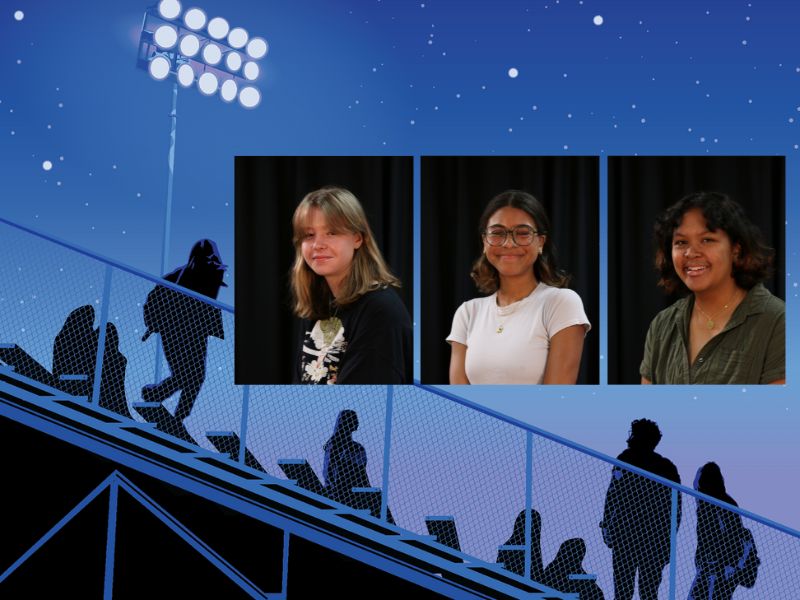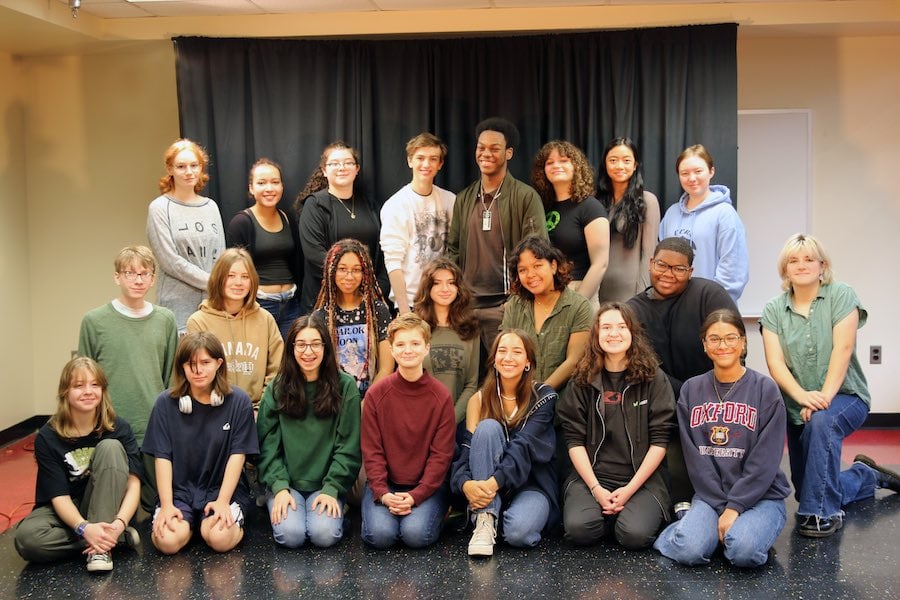By Soa Andriamananjara
When I first read the script for Round House Theatre’s 2024 Sarah Metzger Memorial Play, Spring Break by Joe Calarco, I had two questions: Do teenagers really say “like” that much? And how could anyone deal with its plethora of characters? Spring Break, the second installation of Joe Calarco’s teen-centered series, is a series of vignettes about 19 teenagers as they head to spring break. Each character had only one scene — how could any director work with that?
I had doubts — how was I, a first-time theater director, supposed to meet that challenge? How was I, a junior at Holton-Arms, supposed to direct a show for Round House’s professional stage? But over the past six months, I’ve gone from doubtful to certain.

The Round House Teen Performance Company, composed entirely of local teenagers, has designed, acted, and directed a full production, set to open on March 15. As a company, we’ve gone on a journey similar to that of the characters in Spring Break. The play’s vignette form emphasizes the separation of its characters until they finally unite. In the Teen Performance Company, we initially came into the production as strangers, and now, we don’t want to leave. Like Spring Break’s characters, the Teen Performance Company has truly come together to form a larger community. I’ve brought together various voices from the company: Isabelle Jones (a returning Teen Performance Company actress), Eve Cintron (costume designer), and Jessica Utz and Taylor Payne (costume design mentors). Below, we’ve shared our experiences in the Teen Performance Company.
Why did you decide to join the Teen Performance Company?
Isabelle Jones (teen performer): I joined TPC because I wanted to have a more professional theater experience outside of just high school where I could explore theater as a career. I wanted an experience where I could learn more about different technical aspects of professional theater while also putting on a show entirely comprised of my peers.
Jessica Utz (mentor): I have worked with teens previously and really enjoyed the energy and enthusiasm that they brought to each project, so I was thrilled when I was asked to join the program!
Taylor Payne (mentor): TPC and the education program were part of the original reason I wanted to join the staff at Round House Theatre. With various past teaching experiences, I wanted to be able to continue working with young artists and encouraging creativity and collaboration while producing our mainstage productions.
Soa Andriamananjara (teen director): In my experience, it’s rare for teenagers to have any control over technical and design elements, and most theater education programs only focus on actors. I joined TPC because I wanted the ability to truly see what goes on backstage and in those production meetings and to really see how theater could fit into my life, outside of acting.

What’s it like working with only teenagers?
Isabelle Jones (teen performer): Working with only teenagers has been very exciting! I’ve loved getting to meet and make friends with people my age who are also interested in pursuing theater, and the people I’ve met here are some of the most creative people I’ve ever met. It’s been so cool to learn from such talented people my age, and I’ve made such good friends!
Eve Cintron (teen costume designer): Working with teenagers has been a massive plus of joining TPC; we all relatively understand each other, and everyone has such different and creative ideas without the subconscious limits adults might bring to the conversation. There is a total flow of creativity and humor between everyone. We know the same jokes, understand the struggles of schedule conflicts and school, and generally feel more naturally connected not only because of our closeness in age but also because of our common interest in theater.
Taylor Payne (mentor): Electric! Teenagers are amazing! Especially the teens in our TPC program, I am so impressed at how they all balance their schedules and continue to be invested in every part of the process. From the questions asked in our discipline-specific classes to performing and getting through tech, they are great collaborators.
How has the experience changed how you interact with the theater industry?
Isabelle Jones (teen performer): TPC has helped me learn a lot about how the theater industry works practically. I’ve met so many professionals, not only in the acting field but in every element of Round House Theatre, and it’s helped me gain valuable insight into what a career in theater can look like. I’ve loved meeting adults who are excited about theater, who understand the place I am in life right now, and can offer amazing advice as to how they got to where they are. It’s shown me there are so many different paths to finding your way to being a professional theater artist!
Eve Cintron (teen costume designer): I don’t have much theater experience except doing theater for my high school. But just through the master classes, I have been able to adapt to a more organized way of planning out shows I’m not doing at Round House. And it has certainly changed how I’ve viewed other productions or movies I watch. Now I can’t help walking into a thrift store and not looking for items for a specific character, or analyzing the costume choices in some of my favorite films.
Why do you do theater?
Isabelle Jones (teen performer): I do theater because I’ve found it to be a way to explore and express emotions that I don’t necessarily deal with in real life. I’ve also found that as someone who loves storytelling, theater is a beautiful and interactive way to share a multitude of stories and connect with a wide range of audiences, which I love. Being able to honor and embody someone’s writing is always so exciting and interesting for me.
Taylor Payne (mentor): I grew up around theater because my mother is a theater teacher. What ultimately drew me to pursue my own path was seeing the way being a part of the community and telling stories can give someone a voice or safe space in a way they never had before. It gives room for emotions and expressions that a lot of the rest of the world doesn’t experience. When it works, it’s magic.
It’s your second year doing TPC — what have you noticed in both years?
Isabelle Jones (teen performer): I think both years the company has been filled with super talented people who are just excited about theater. Getting to put on a show with a cast comprised of your friends, directed and designed by your friends, is such a unique experience, and both years it’s been so much fun meeting new talented people. Last year, both since it was my first year and since I was younger, I think I was more nervous when coming into the company and definitely had a lot more social anxiety during masterclasses, rehearsals, etc. This year, I think it’s been easier for me to enjoy things more because I think I’m an overall more confident person.

What motivates you to work with young people in theater?
Taylor Payne (mentor): Working with teenagers makes me smarter! I am constantly learning new things about the world, culture, and challenges by talking with the members of the cast and crew, especially when discussing character and the meaning in the play. By being new to theater as young artists, many of them constantly are bringing something new and fresh to the process.
What’s it like being in charge of designing an aspect of the show?
Eve Cintron (teen costume designer): There is an aspect of stress in being in charge of something so obvious in theater. But I’ve enjoyed it a thousand times more than I anticipated. Doing costumes has truly brought out a creative and thoughtful side of theater that I never knew existed. Everything my mentors have led me through has appealed to my artistic interests, and I’ve gotten it done quite quickly as a result because I can’t wait to start the next step of the process.
What excites you the most about Spring Break?
Jessica Utz (mentor): I like the visuals of the overlapping stories presented in Spring Break. It really shows how everyone is connected in some way.
Isabelle Jones (teen performer): Getting to show our audiences the teen experience that you don’t always see on TV or in movies of the realities of growing up and growing apart is something exciting. I think it’s a really relatable play for people of all ages, because everybody goes through growing up and losing people you care about, and it doesn’t get easier no matter how old you are. I think giving people a space to process that and relate to that is really special.
Soa Andriamananjara (teen director): Teenagers being able to be teenagers. For most high school shows, teenagers are forced to play 40-year-olds. In this show, teenagers play teenagers. I think the script does a great job of noticing our speech patterns through its punctuation and the use of the word “like.”
What do you hope the audience takes from the show?
Eve Cintron (teen costume designer): I hope that the audience understands the complexity of teenagers by watching Spring Break. I think teenagers are unfairly stereotyped to be moody and shallow, and I think this show portrays them in a more vulnerable light. The show speaks greatly to teens but also to the change they’re going through in this day and age, and I hope that parents in the audience might then be able to understand their child, or other teenagers they know, a little better by watching it.
Taylor Payne (mentor): That they can see themselves in these characters. The best part about doing a show that features characters that reflect real people is that it allows for better representation. Having someone get to express one sentiment from the play could finally put into words how an audience member is feeling.
Soa Andriamananjara (teen director): I hope that the audiences reflect the show — I hope that the audience is able to unite in the same way the characters do. I hope that everyone in the audience can relate to the characters in the show in some way. I also just hope they have a great time and that we send them off to their own spring break!
Spring Break plays March 15 to 16, 2024, at 7 pm and March 17 at 2 pm, as part of Round House Theatre’s Teen Takeover Weekend. The weekend will also include a special comedy and improv presentation, performed by The Roundlings teen ensemble, on March 16 at 2 pm. Tickets ($25, free to students) are available online.





